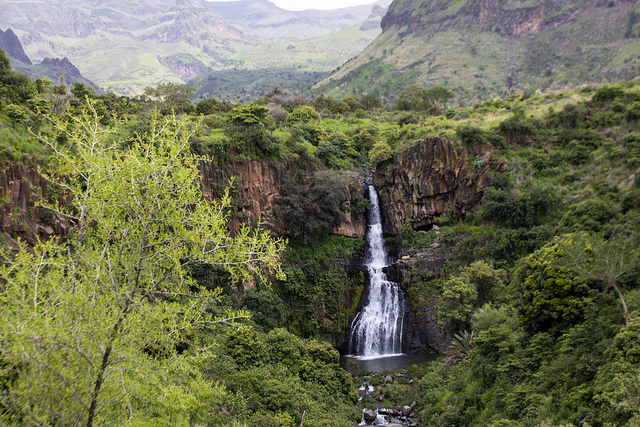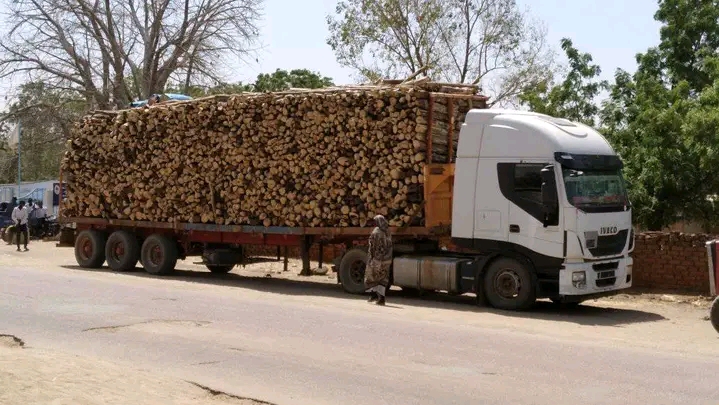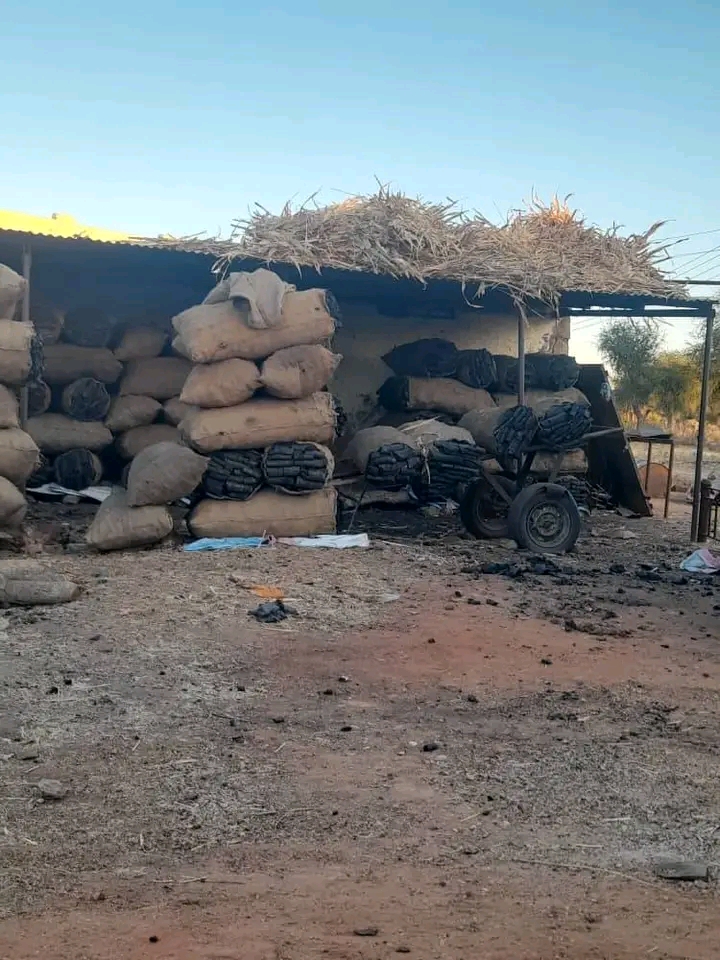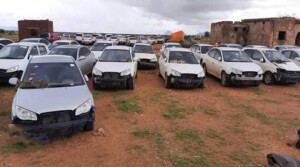Illegal logging, charcoal burning, and gum tapping threaten Sudan’s woodlands
The environmental dangers of deforestation in Sudan have been highlighted by experts. Yet, not much has been done in practice to protect woodlands and forests. Those supposed to enforce legislation, such as the army and local governments, reportedly benefit from illegal logging and charcoal trade.
 A forest and waterfall in Jebel Marra, Central Darfur (File Photo: Yousif Bilal/ UNAMID)
A forest and waterfall in Jebel Marra, Central Darfur (File Photo: Yousif Bilal/ UNAMID)
A forest and waterfall in Jebel Marra, Central Darfur (File photo: Yousif Bilal / UNAMID)
By Camille Straatman
The environmental dangers of deforestation in Sudan have been highlighted by experts. Yet, not much has been done in practice to protect woodlands and forests. Those supposed to enforce legislation, such as the army and local governments, reportedly benefit from illegal logging and charcoal trade.
As Radio Dabanga reported in its climate change feature, Sudan is witnessing changes in its climate, especially higher temperatures and changing rainfall, which leaves the country more prone to droughts and floods.
On top of these climate changes, environmental pollution, illegal logging, and irrigation problems all put more stress on Sudan’s ecosystems and make the country less resilient. The illegal logging or tapping of trees can thus have a widespread impact.
Environmental degradation
Illegal deforestation and charcoal production lead to significant environmental degradation. This not only severely impacts ecosystems’ health but also people’s livelihoods.
“This started in the 1970s with the establishment of big farms for which many trees were cut, especially in the south, but without any solution, any mitigation of the impacts on the local climate,” economic and political analyst Hafiz Ismail recalled in the RD feature.
“This impacted many areas in North Darfur and North Kordofan. They became uninhabitable and people lost their livelihoods. There is no water and no grazing land for the animals due to climate change, and there is no awareness of that.”
‘People are not actually aware of the dangers of deforestation’ – Hafiz Ismail
On top of grazing land, the environmental degradation caused by tree logging is also impacting one of Sudan’s most important industries: Gum Arabic production.
“The gum Arabic belt is moving south. In a few years, we will not have gum Arabic production in Sudan. It is all going to South Sudan because of climate change. Tree logging is one of the reasons for this. People are not actually aware of the dangers of deforestation,” Ismail explained.
Desertification
Abdelrahim Kunda from the Nuba Mountains in South Kordofan also linked the felling of trees to increased desertification. The felling of trees, overgrazing of land, and poor agricultural practice also led to erosion and falling groundwater levels, the reporter explained, and wildfires are becoming more common too.
Sand dunes are encroaching on pastures and green spaces in the northern parts of South Kordofan, expanding the increasingly desert-like area in which little life can grow or graze.

Reasons behind excessive logging: farming and charcoal
Kunda explained that trees in the Nuba Mountains are subject to excessive logging for several reasons.
The first reason, as Ismail explained, is the clearing of land for agriculture. “After the entry of agricultural machines in 1972, the government granted northern Sudanese investors and retired army and police generals large areas of woodland in Habila, Dalami, Um Lubia, and Kartala. Roughly 525,000 acres in total were granted to generals and investors, at the expense of the population of Nuba Kolib, who were forced to leave their villages,” Markazu said.
At least 54 villages were abandoned as people lost their land and headed to the north in search of a new home that provided them with a decent livelihood.
Furthermore, “people in the Nuba Mountains traditionally also rely on agriculture for their livelihoods, and this requires expansion of agricultural land for which they remove trees”. People traditionally cut and remove trees using axes or burn swathes of forest.
Automated agriculture, however, requires large areas and trees were being removed in a way that did not take into account the preservation of the environment, Markazu explained.
This is locally called “Um Bahti”, where the trees are removed from their roots by an axe machine after which the roots are dug up using the phase machine.
The branches and stems are burned to create charcoal. The latter forms another reason for excessive tree felling. In large areas of Sudan, people rely on charcoal as a source of energy, especially in cooking food and heating in cold times as other alternative sources such as solar energy, diesel fuel, or gas are inaccessible to many.
Amidst these problems, the demand for logged wood is increasing too. The economic crisis and military practices responsible for rising fuel prices are making many more Sudanese dependent on wood and charcoal, instead of fossil fuels.
Therefore, trees are constantly cut down throughout the year. The larger the population, the greater the demand for coal fuel and firewood.
War and displacement
In Darfur, in particular, the war that broke out in 2003 and the genocide against African farmers and mass displacement that followed have been big contributors to deforestation. As millions were forced to leave their farms, people turned to wood for their basic needs: to keep warm and to build shelter. Many displaced have turned to timber trade or carpentry for some form of income as well.
There have also been reports of militiamen purposefully destroying trees and orchards. In 2018, when Omar Al Bashir was still in power, Radio Dabanga reported that 2,000 fruit trees were cut in Kutum in North Darfur, allegedly to prevent displaced farmers from returning to the area.
“New settlers, backed by militiamen of the Border Guards cut about 2,000 date palms and lemon, guava, and mango trees,” El Tayeb Kafout, Independent MP for Kutum constituency, told Radio Dabanga. “They want to prevent the displaced owners of the land and the orchards from returning to their villages,” he explained. “And if the area is inhabited by others, it will be difficult for the original owners to prove the land was theirs.”
‘They want to prevent the displaced owners of the land and the orchards from returning to their villages’ – El Tayeb Kafout
He pointed out that “these forces [nomads backed and armed by the government] benefited throughout the war from the orchards. They used to sell the fruits at the markets in the region, while the land owners were forced to search for refuge in the nearby Abuja and Abu Shouk camps for the displaced near El Fasher. Now the displaced are returning, they began to destroy the trees”.
Industries
Several industries are big consumers of wood too. “Municipal ovens in cities and urban areas depend on firewood because it provides high thermal energy for the bread industry and, due to the migration of rural people to cities, the demand for firewood has increased,” Markazu explained.
Similarly, the furniture industry is a big consumer. Mahogany, Sycamore, and Beech trees are used by carpenters to manufacture chairs, beds, and cupboards and the like. Markazu explained that carpenters recently resorted to the use of automatic chainsaws, which expanded the types and quantities of trees they can cut.
Many Sudanese women, especially newly married women, also rely on Acacia wood for fragrant ‘smoke’. Acacia firewood finds unparalleled popularity in cities and villages as people believe that the smell of smoke makes the husband closer to his wife.
Wood, grass, genam, and bark are also key ingredients for the construction of buildings. Rural residents depend entirely on trees in the process of building their homes and fencing them. Poor urban residents also depend on wood for their huts and fences.
Lastly, nomadic herding tribes, especially camel herders from the Shanabla and Hamar, depend on clapping trees to feed their animals, such as camels and sheep. Especially in the summer when the weeds dry up and the pastures narrow, herders spend eight months in South Kordofan because of the abundance of water.
Here, the shepherds cut the branches of trees, especially the Heglij and Baobab trees, to be fodder for their animals. The shepherds also rely on wood for the construction of their houses and animal pens.

Economic dependency and corruption
One of the main challenges to protecting forests and woodlands better is the dependence of the government at all levels (federal, state, and local) on the revenues from the forest sector as they “impose fees and levies on charcoal and firewood”.
Not only woodlands in South Kordofan, but also in White Nile state and South and Central Darfur are subject to excessive logging.
In April last year, people in Ed El Fursan in South Darfur staged a sit-in to protest the illegal felling of trees. The protesters lamented the inaction from different levels of government.
Ibrahim Zakaria, agricultural engineer, member of the People’s Committee for Forest Protection, and head of the Ed El Fursan Youth Forum for Development and Peaceful Coexistence, told the political organisation Sudanese Demanding Bodies Association that inaction from authorities is a big problem.
The sit-in demanded the dismissal of the Forestry Department director in the locality and the correct application of the Forests Law because it should guarantee protection.
Having worked in the forestry sector for a decade, Zakaria observed how easy it is for people to violate the Sudanese Forest Law as authorities allow anyone to cut trees, regardless of the species.
Kunda in South Kordofan also told Radio Dabanga that logging is officially prohibited, except with written permission and under the supervision of the forestry officer, but that the Forestry Department does not abide by the law.
It certifies the cutting of forests under the pretext of cleaning the land for agriculture and grants these certifications to charcoal traders annually. State government and local authorities have no practical plans to protect the environment, especially forest wealth, he reported.
Hafiz Ismail also explained that “tree logging and making charcoal is prohibited, but it is easy to get permission to log trees and make charcoal. Full lorries arrive from Kordofan with charcoal, and no one cares. It is starting to become very lucrative and is even exported to many other Arab countries”.
The emergence of companies and investors who export charcoal to the Gulf countries and Egypt, facilitated by the federal government in Khartoum, was also described by Kunda. “This exposes trees, especially Talh, an Acacia variety, to unjust cutting and extermination for the greed of traders and corrupt people in government offices,” he said.
The protected status of many forests has also been cancelled in many areas whilst funding for reforestation and better control has declined.
Army influence
Next to inaction and corruption in government officers, people also mention the role of the military in cutting trees.
Ismail explained that army officers fell trees for charcoal sales in the northern parts of South Kordofan. These officers reportedly earn money from illegal logging.
‘We demand a halt to the vehicles of the armed forces that are now cutting trees in the locality in a frightening way’ – Ibrahim Zakaria
Protesters who held the sit-in against the illegal cutting of trees in Ed El Fursan last year also called out the military activities.
They demanded “a halt to the vehicles of the armed forces that are now cutting trees [for commercial purposes] in the locality in a frightening way”, Zakaria said.
He added that another demand is the issuance of a clear decision by the leadership of the 16th Infantry Division to stop the vehicles of the Armed Forces from transporting firewood from the locality because this public transportation of wood encourages other people to attack the trees in the area as well.
The local Agricultural Office informed the Sudanese Demanding Bodies Association that about six million trees were cut down in 2016 and 2017 in the region.
Gum tapping
Another tree species that faces significant threat is the Boswellia Sacra, commonly known as Frankincense or Olibanum tree, from which Frankincense sap is harvested.
Frankincense, the dried sap, is used in the medical, cosmetic, and food industries and is in high demand in the global markets, which led to an increase in its prices.
The tapping of this particular tree for sap is harmful to the trees and the ecosystem.
Last month, the Zalingei Resistance Committees condemned the decision by the acting governor of Central Darfur, Saad Adam, to revoke a law that banned the tapping of the Olibanum tree. He allowed the tapping of olibanum-tree again in all localities of the state.
In a statement in mid-October, the Resistance Committees said that meetings about the legislation decision were held in Mukjar, under the guard of military forces.
A sit-in was staged in Mukjar to demand an end to the tapping of the Olibanum tree and the protection of the local forests.
The protesters explained that the forests are paramount to balance different environmental and climatic changes and should thus be protected to ensure climate resilience.
Central Darfur is one of the most forest-rich states in Sudan, a country in which at least two-thirds of the land is desert or semi-desert.
The volume of forests in Central Darfur exceeds 30 per cent of the total area but only 7 per cent of forest areas are protected reserves according to the Forestry Authority. According to scientists, tree density has gone down in Central Darfur from 400 trees per hectare in 1998 to 27 trees per hectare in 2016 and things have not improved since.


Security
Protecting the few forest-rich areas in Sudan is vital for its future stability and security.
In 2007, the United Nations Environment Programme already warned that critical environmental issues, such as land degradation, deforestation, and the impacts of climate change, “threaten Sudan’s prospects for long-term peace, food security, and sustainable development”.
Especially in Darfur, where violence and insecurity continue to prevail. “Not only are the adequate management and rehabilitation of natural resources fundamental prerequisites to peacebuilding in Darfur and the rest of Sudan – they must be considered national priorities if the country is to achieve long-term social stability and prosperity,” UNEP wrote.











 and then
and then